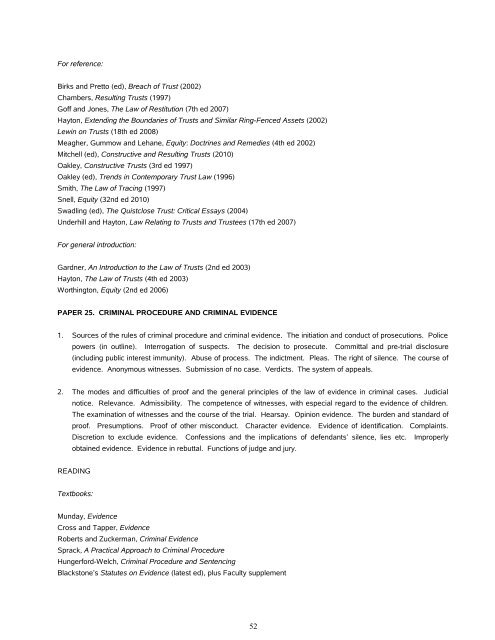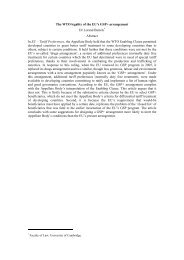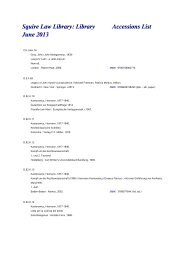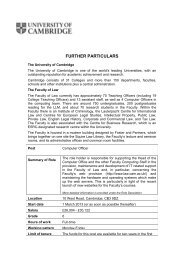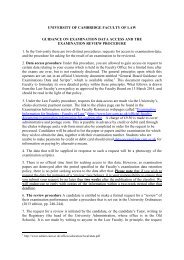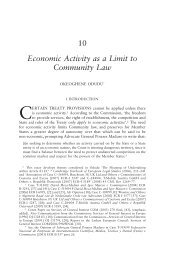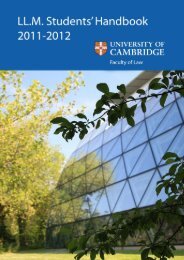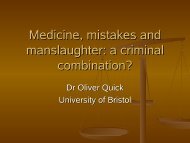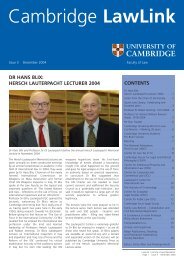Contents - Faculty of Law - University of Cambridge
Contents - Faculty of Law - University of Cambridge
Contents - Faculty of Law - University of Cambridge
You also want an ePaper? Increase the reach of your titles
YUMPU automatically turns print PDFs into web optimized ePapers that Google loves.
For reference:Birks and Pretto (ed), Breach <strong>of</strong> Trust (2002)Chambers, Resulting Trusts (1997)G<strong>of</strong>f and Jones, The <strong>Law</strong> <strong>of</strong> Restitution (7th ed 2007)Hayton, Extending the Boundaries <strong>of</strong> Trusts and Similar Ring-Fenced Assets (2002)Lewin on Trusts (18th ed 2008)Meagher, Gummow and Lehane, Equity: Doctrines and Remedies (4th ed 2002)Mitchell (ed), Constructive and Resulting Trusts (2010)Oakley, Constructive Trusts (3rd ed 1997)Oakley (ed), Trends in Contemporary Trust <strong>Law</strong> (1996)Smith, The <strong>Law</strong> <strong>of</strong> Tracing (1997)Snell, Equity (32nd ed 2010)Swadling (ed), The Quistclose Trust: Critical Essays (2004)Underhill and Hayton, <strong>Law</strong> Relating to Trusts and Trustees (17th ed 2007)For general introduction:Gardner, An Introduction to the <strong>Law</strong> <strong>of</strong> Trusts (2nd ed 2003)Hayton, The <strong>Law</strong> <strong>of</strong> Trusts (4th ed 2003)Worthington, Equity (2nd ed 2006)PAPER 25. CRIMINAL PROCEDURE AND CRIMINAL EVIDENCE1. Sources <strong>of</strong> the rules <strong>of</strong> criminal procedure and criminal evidence. The initiation and conduct <strong>of</strong> prosecutions. Policepowers (in outline). Interrogation <strong>of</strong> suspects. The decision to prosecute. Committal and pre-trial disclosure(including public interest immunity). Abuse <strong>of</strong> process. The indictment. Pleas. The right <strong>of</strong> silence. The course <strong>of</strong>evidence. Anonymous witnesses. Submission <strong>of</strong> no case. Verdicts. The system <strong>of</strong> appeals.2. The modes and difficulties <strong>of</strong> pro<strong>of</strong> and the general principles <strong>of</strong> the law <strong>of</strong> evidence in criminal cases. Judicialnotice. Relevance. Admissibility. The competence <strong>of</strong> witnesses, with especial regard to the evidence <strong>of</strong> children.The examination <strong>of</strong> witnesses and the course <strong>of</strong> the trial. Hearsay. Opinion evidence. The burden and standard <strong>of</strong>pro<strong>of</strong>. Presumptions. Pro<strong>of</strong> <strong>of</strong> other misconduct. Character evidence. Evidence <strong>of</strong> identification. Complaints.Discretion to exclude evidence. Confessions and the implications <strong>of</strong> defendants’ silence, lies etc. Improperlyobtained evidence. Evidence in rebuttal. Functions <strong>of</strong> judge and jury.READINGTextbooks:Munday, EvidenceCross and Tapper, EvidenceRoberts and Zuckerman, Criminal EvidenceSprack, A Practical Approach to Criminal ProcedureHungerford-Welch, Criminal Procedure and SentencingBlackstone’s Statutes on Evidence (latest ed), plus <strong>Faculty</strong> supplement52


